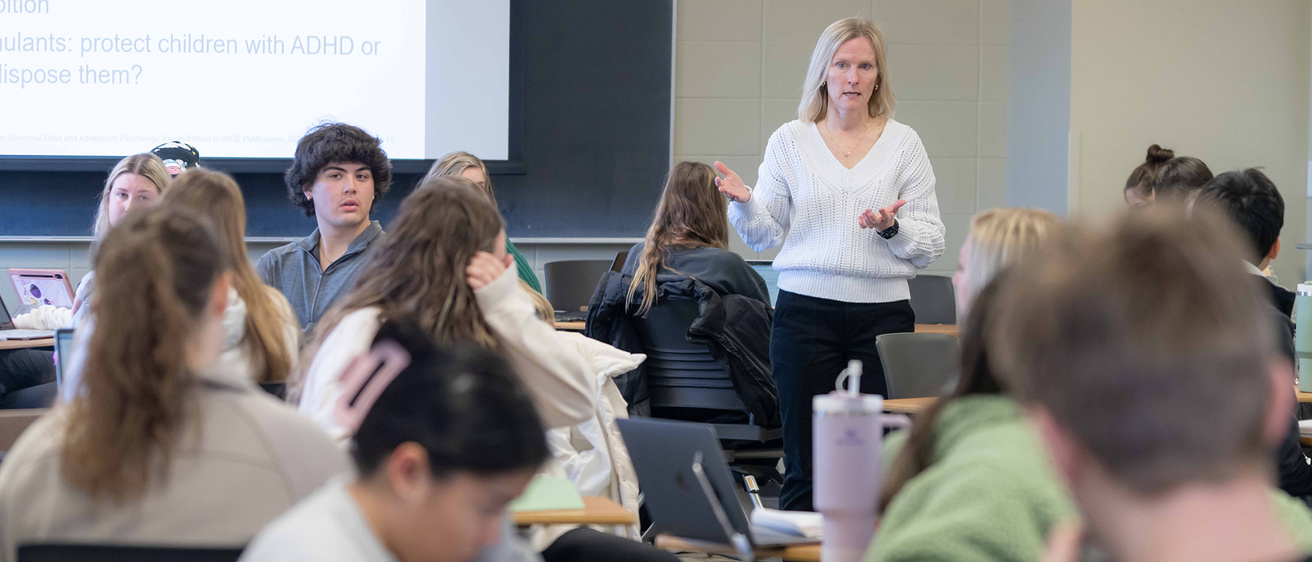The formula seems clear. To sufficiently support the mental health needs of our communities, we need more helping professionals. To add more helping professionals to the workforce, we need more academic offerings to ensure proper levels of education and preparation.
Showing dedication to the advancement and training of individuals pursuing a career in the helping professions, the University of Iowa College of Education recently expanded its undergraduate offerings to include a new Bachelor of Arts Counseling and Behavioral Health Services (CBHS) degree.
“There is a critical need for an expanded behavioral health workforce in Iowa and across the nation,” says Martin Kivlighan, professor of Counseling Psychology and departmental executive officer (DEO) of Psychological and Quantitative Foundations, the department under which the new CBHS degree will be housed. “This program will introduce students to the world of counseling and the helping professions, which will ultimately increase the number of helping professionals available to address the severe mental health crisis we currently face.”
– Martin Kivlighan, Counseling Psychology professor and program director
In essence, this new major is designed to serve undergraduate students who want to develop a foundation in helping processes and human behavior.
“A distinctive aspect of this program is that it will offer a number of clinical and human service-oriented courses that will add unique value for the students,” says Noel Estrada-Hernández, professor of Rehabilitation Counseling, DEO of theDepartment of Counselor Education, and co-developer of the CBHS program.
By leveraging faculty expertise from the College of Education and UI College of Public Health, students will learn to apply critical thinking and problem-solving skills within various helping professions, preparing them for entry level positions in nonprofit agencies, government agencies, community centers, clinics, and service navigation programs.
“What makes this program unique in the country and excites me is that it has been built with the student experience in mind. Students will be able to learn about opportunities for a career in counseling and in other helping professions and the ways all these professions can improve and impact mental health,” says College of Public Health Dean Edith Parker. “Helping students explore what might best fit them is key to their professional success. This program will help students make informed decisions about their future in making an impact through the helping professions.”
“This program was built on an inclusive framework that utilizes the expertise of the faculty from both Counselor Education and Psychological and Quantitative Foundations,” says Estrada-Hernández. “Being housed in College of Education, with proximity to and collaborations with the Scanlan Center for School Mental Health is significant … not only in the training we do, but also with our outreach. The specialties within the program also highlight partnerships with educators from other colleges, including the UI College of Public Health, through which core courses and approved electives will give students a unique opportunity to learn more about the helping professions landscape."
With this unique CBHS degree, graduates will become more marketable for occupational opportunities, including employment as chemical dependency counselors, rehabilitation assistants, school support specialists, life skills instructors, youth workers, child life specialists, domestic violence shelter advocates, and more.
“There are few undergraduate programs in counseling throughout the country and we are excited about this new opportunity for students to take applied psychology and counseling courses and participate in experiential learning opportunities,” says Kivlighan.
Path to Licensure
The CBHS program can also prepare students for their graduate studies, which can lead to a career as a licensed mental health professional. CBHS students will obtain a strong foundation to continue their education with a terminal, licensed-oriented counseling/mental health related graduate degree in a variety of fields, including school counseling, rehabilitation and mental health counseling, counseling psychology, school psychology, and more.
CBHS will help provide a more seamless transition into many of the college’s nationally ranked counseling/mental health graduate programs, which could impact Iowa’s severe shortage of psychologists, for example. The state currently ranks 46th in the number of psychologists per capita, and this new undergraduate program could eventually help address this critical shortage of licensed providers.
“Training future graduate students will help us increase the number of mental health providers in rural settings, improve access and integrating mental health services into primary care settings and schools, enhancing cultural competence and diversity within the mental health workforce challenging stigma and related social issues,” says Estrada-Hernández.
See a Need, Fill a Need
The CBHS program was also created as a result of considerable student demand to offer an undergraduate degree in the helping professions, including counseling. This includes an opportunity to provide first-generation, underrepresented, and nontraditional undergraduate students with knowledge about and competitive preparation for graduate programs that lead to careers in the helping professions, including licensure-based mental health opportunities.
“The state of Iowa is in urgent need of people from diverse backgrounds in fields that address the mental health of children, adults, and families,” says Estrada-Hernández.
The multi-disciplinary focus of the CBHS major also enhances strategic goals for research and discovery. Its core curriculum provides students with the building blocks for research collaboration, including knowledge of individual differences; research-based interpersonal communication skills (such as active listening); and discovery of how cultural and personal differences can affect the work environment.
The CBHS degree received formal approval from the Iowa Board of Regents on April 25 and began accepting applications immediately. The first cohort, which is expected to consist of around 60 students, is slated to begin classes in the fall of 2024. The program is projected to grow to around 150 students by its fifth year.
“The need for counselors and other mental health care providers in our state, particularly in our schools and rural communities, has never been greater,” says UI College of Education Dean Daniel Clay. “Students graduating with this new undergraduate Counseling and Behavioral Health Services degree will be well prepared, whether it’s for an entry level human service role or for graduate training in a program leading to licensure to practice.”
